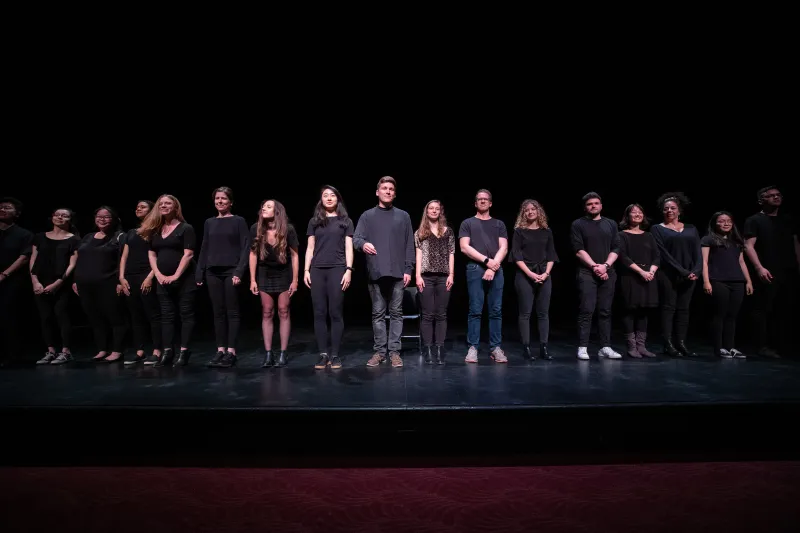On-campus production highlights mental health and the stigma surrounding it
“Insane. Incompetent. Irrational. Unhinged. Not capable. Are you f**king crazy?”
After the lights dimmed, these words and other derogatory phrases were flung across the stage by cast members, culminating in a cacophony of shouting that was sharply cut off by the stomp of a foot. In the ensuing silence, the full cast headed for the wings.
Then, an actor stepped on stage, and the first monologue began.
Pigott Theater was sold out on Thursday for the opening night of “The Manic Monologues,” a production highlighting the brave and true stories of people living with mental illnesses. The two-act show features 18 monologues; three are cast members’ own stories, and the rest, which are performed by the production’s actors, were submitted anonymously by individuals across the continent. The show’s cast is incredibly diverse, featuring Stanford students, mental health organization affiliates and others, all with various levels of acting experience.
According to the National Alliance on Mental Illness (NAMI), approximately one in five American adults experience mental illness in a given year. However, because of how stigmatized the topic is, people living with mental health conditions oftentimes feel isolated and alone, and conversations about these issues are severely limited.
Nearly two years ago, Zack Burton and his girlfriend, Elisa Hofmeister, experienced this sense of isolation in the wake of Burton’s first psychotic break and bipolar diagnosis at Stanford. It was their drive to address the lack of visible narratives and conversation spaces regarding mental illness that resulted in their vision for “The Manic Monologues.”
Inspired by “The Vagina Monologues” (a production that uses storytelling to fight the taboo surrounding female sexuality), Burton and Hofmeister sought to collect stories that reflected a wide range of experiences with mental health and illness. Though neither of them had any experience with theater prior to this production, they were advised by mental health experts Dr. Rona Hu and Dr. Stephen Hinshaw, performer Victoria Maxwell, playwright Amy Freed and many others to bring their vision to life.
The stories highlighted in the production deal with a variety of topics, from having PTSD to living with hypersexuality. I was particularly moved by “Almost 17,” a monologue about a mother’s broken relationship with her son in the wake of her suicide attempt.
“What reminds you of your mother?” the actress asked. “Is it the sweet smell of vanilla? A kiss on the forehead? The teddy bear you still keep on your bed?” Starting to get choked up, she continued. “Or is it instead the sound of a woman crying late at night, the smell of the stale hospital, or the sight of kitchen knives like the ones I used to hoard?” As she wiped tears from her eyes, she quietly said, “I wonder sometimes if the mother I wanted to be, rather than the one I was, will count in my favor.”
Powerful and painful stories such as these drew tears aplenty from the audience, but some stories drew laughter, too. Burton and Hofmeister struck a perfect balance between the ups and downs of living with a mental illness through the stories they selected, interspersing narratives of struggle and weariness with tales of resilience and hope.
Having conversations about mental health has always been important, but in a school year with two student suicides and a continuous push from students to expand mental health resources on campus, it is clear that the subject is at the forefront of students’ minds. “The Manic Monologues” could not be more timely.
By using the stage to tell the truths of countless individuals, Burton, Hofmeister and the rest of “The Manic Monologues” team were able to create something authentic, deeply moving and radically important. The production itself is proof that people living with mental illnesses are not alone in their experiences, and that personal narrative and communication have the power to change the discourse surrounding mental health.
“Thank you for being part of the conversation and for carrying it further,” Burton said after sharing his story. “Together, we can disrupt the stigma.”
The team behind the “The Manic Monologues” is working to make these stories accessible across the country by providing funding for theater groups who want to bring the show to their communities and schools. To this end, they have started a GoFundMe campaign, which can be accessed through the production’s website.
NOTE: This article was updated on May 25, 2019. An earlier version of this article referred to a monologue about “having schizophrenia and PTSD,” although the monologue was only about having PTSD.
Contact Kaylee Beam at kbeam97 ‘at’ stanford.edu.
